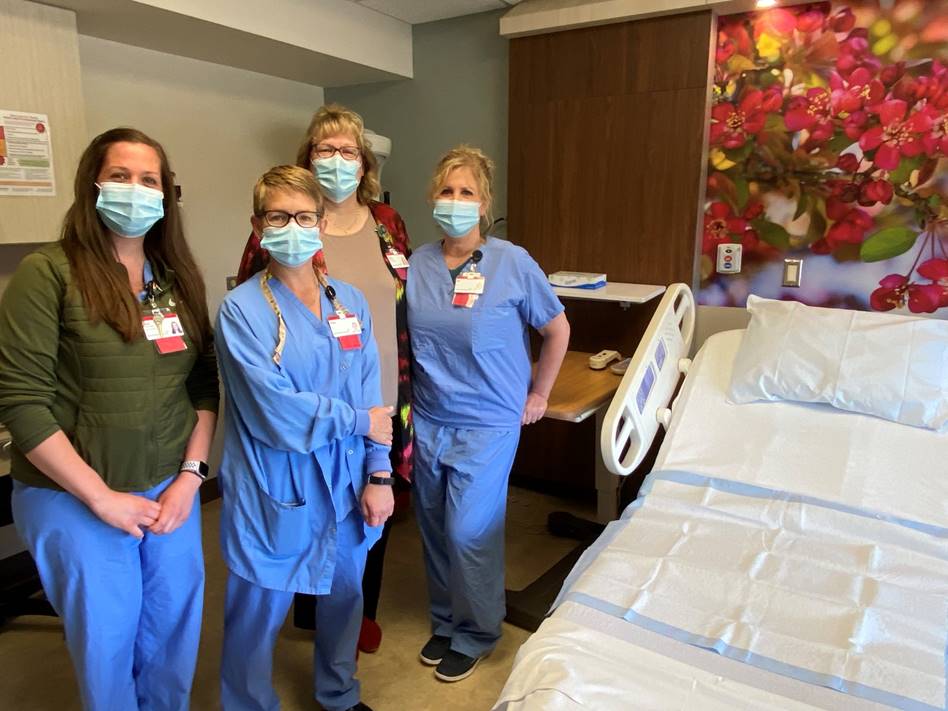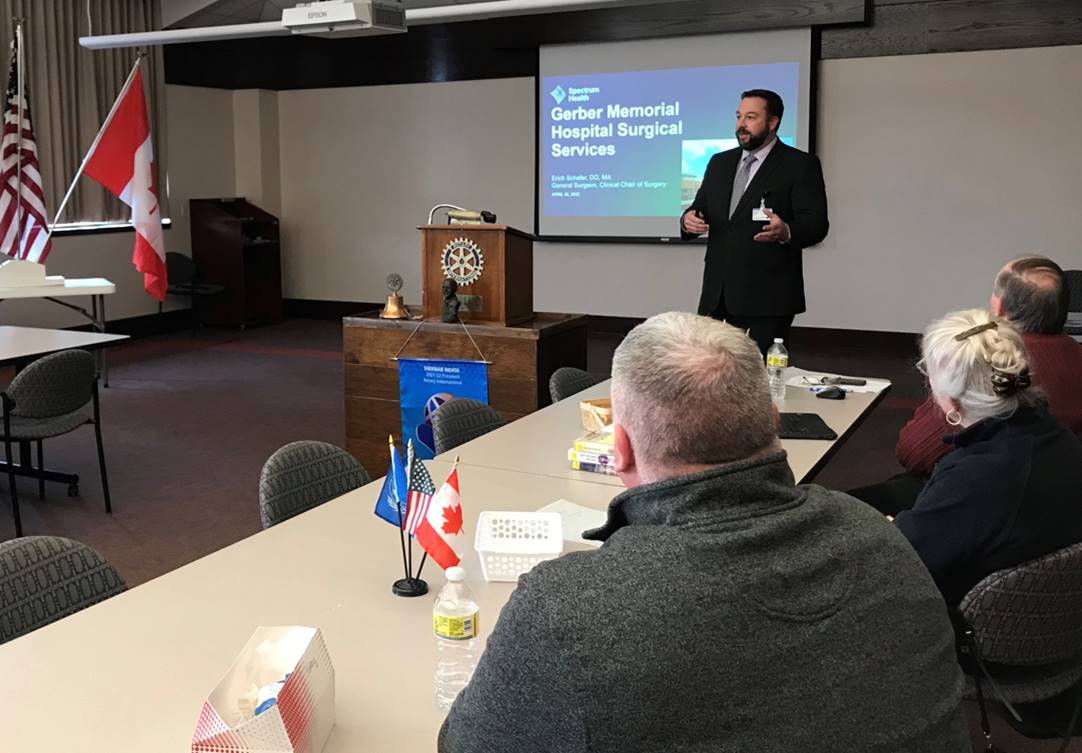|
Spectrum Health Gerber Memorial Earns Another Top Maternity Care Honor
Designation denotes safe patient outcomes at Family Birthing Center. Fremont, Mich., May 26, 2021 – Spectrum Health Gerber Memorial has earned a platinum designation – the highest recognition – for maternal care from the Michigan Alliance for Innovation on Maternal Health (MI AIM). MI AIM works with birthing hospitals to reduce and eliminate preventable maternal mortality and severe morbidity. Hospitals implement structured “safety bundle” plans to improve health outcomes for mothers to combat the leading causes of maternal mortality such as obstetric hemorrhage and severe hypertension. “For Spectrum Health Gerber Memorial, the top designation from the Michigan Alliance for Innovation on Maternal Health is a testament to the outstanding work our team does every day to provide personalized, compassionate and quality care for mothers and their children,” said Gerber Memorial President Drew Dostal. “We are extremely proud of our physicians, physician assistants, nurse midwives, nursing team and many others for their commitment to caring for moms and their children before, during and after birth so they can enjoy a strong start in life. From helping mothers-to-be embrace healthy habits to connecting parents with local resources, our maternity care team truly embodies Spectrum Health’s mission to improve health for the families we serve.” Safety bundle plans help hospitals by defining actionable protocols, education, equipment and drills to prevent and treat serious maternal events. The platinum designation is MI AIM’s highest rating. Hospital designations were announced May 25. Spectrum Health Gerber Memorial Hospital was one of seven Spectrum Health Hospitals to earn the platinum designation for the 2020 year. The others are:
Spectrum Health Ludington Hospital and Spectrum Health Lakeland Saint Joseph Hospital earned gold level designation, the second-highest ranking. The AIM MI award is Gerber Memorial’s second top award for maternity care this year. Earlier this month, The Economic Alliance for Michigan (EAM) awarded Gerber Memorial Hospital with a Hospital Maternity Care Excellence Award for the third year in a row. The EAM award recognizes hospitals that are effectively working toward helping decrease the state’s infant mortality rate, reduce the rate of unnecessary C-sections, and be an educational resource for new and expecting parents residing in Michigan.
0 Comments
Mental Health Awareness Month wraps up with a message
By Carol Mills, Executive Director, Newaygo County Mental Health January is National Mentoring Month. February is National Bird Feeding Month. April is Jazz Appreciation Month. There are some awareness issues on the list that I have never heard of. Some of them are only given days, while others get a whole month. World turtle day is just around the corner on May 23. There is a day or month for nearly every cause under the sun. So how do you get a day or a month dedicated to your causes? What is the process for that anyhow? Is there a cause committee? May is Mental Health Awareness month. It is the month that we educate people on mental health issues, and work to reduce the stigma that prevents many people from seeking help. During the month of May, we at Newaygo CMH have published several articles on mental health issues that affect the Newaygo County Community. We hope that these articles have provided information and resources about topics that are important to our everyday lives. Having designated months and days that commemorate and educate the public about health and social issues are important. These messages serve to remind us that we need to always be aware of health issues that can impact ourselves and our families. These are issues we face 24/7, 365 days a year. Mental Health and Mental Illness doesn’t take a holiday come June. We work every day to ensure that people are able to receive the services they need. Overcoming the stigma of seeking mental health services is a challenge for mental health professionals. Mental Health has come a long way in the past 50 years, but the journey isn’t over. One of the effects of Michigan’s “Stay Home, Stay Safe” executive order was an increased social isolation and a lack of access to support systems. During the pandemic people reported increased stress, loneliness, anxiety and depression. Substance use also increased dramatically. Helping people to understand that seeking assistance with issues isn’t a weakness, or a deficit – it is a strength to understand that we can’t do everything alone. Sometimes we need help and guidance. Newaygo CMH is your public mental health center serving residents of Newaygo County. We provide supports to both children and adults that have mental illness, substance use or intellectual and developmental disabilities. COVID has taught us many lessons, and allowed us to see both the good in people, and the struggles of living in a judgmental society of social media and misinformation. The truth, which always seemed so simple before, is now evasive and hard to find. People wonder who to trust, and who to believe. What was once easy, is now made more difficult by misinformation and misguided facts that constantly bombard our news feeds. For those who are struggling to cope, please seek help. There are amazing professionals who can help you find resources and assistance. Every day is Mental Health awareness day. Please take care of yourself and your family – and let us know if we can help. Please call 231-689-7330 for assistance. We are available 24/7 for crises and emergencies. Sleep: An important part of your Health
By Gregory J. Hayes, MA, LPC May is Mental Health Awareness Month. We asked the staff of NCMH if they might be willing to contribute some writings in an effort to help spread understanding of the role MH issues play in all of our lives. The last piece looked at stigma and misunderstanding. https://www.nearnorthnow.com/living-well/a-unfortunate-and-misleading-stigma Today Mr. Hayes tackles the relationship between our health and the sometimes elusive but always welcome activity known as sleep “Sleep is that golden chain that ties health and our bodies together.”-Thomas Dekker As a mental health therapist I work with clients on many different types of mental health and emotional issues. If there is one thing that is common to many individuals who have been diagnosed with a mental illness or who have an emotional issue that they are struggling with it is their sleep. The pattern and type of sleep that a person has a direct bearing on their mental and physical health. This is why when you see either a physical healthcare provider or a mental healthcare provider, you may get asked about your sleep. So what is sleep? The following definition from Wikipedia describes sleep: “Sleep is a naturally recurring state of mind and body, characterized by altered consciousness, relatively inhibited sensory activity, reduced muscle activity and inhibition of nearly all voluntary muscles during rapid eye movement (REM) sleep,[1] and reduced interactions with surroundings.[2] It is distinguished from wakefulness by a decreased ability to react to stimuli, but more reactive than a coma or disorders of consciousness, with sleep displaying different, active brain patterns.” What is the purpose of sleep? According to the Sleep Foundation: “Sleep powers the mind, restores the body, and fortifies virtually every system in the body.” So, understanding what sleep is and what sleep does is important to helping an individual to maintain both their physical and mental health. Being able to get “good” sleep should be one of the goals for everyone who wants to achieve good health. The question often asked by a client is: “How much sleep do I need?” The chart below from the Sleep Foundation provides some insight as to how much someone may need based on their age. Please note: Every individual is different and the amount of sleep one gets can vary. The recommended sleep times are broken down into nine age groups. Age Range Recommended Hours of Sleep Newborn 0-3 months old 14-17 hours Infant 4-11 months old 12-15 hours Toddler 1-2 years old 11-14 hours Preschool 3-5 years old 10-13 hours School-age 6-13 years old 9-11 hours Teen 14-17 years old 8-10 hours Young Adult 18-25 years old 7-9 hours Adult 26-64 years old 7-9 hours Older Adult 65 or older 7-8 hours The next question often asked is: “What can I do if I feel I am not getting enough sleep?” Step one should be to contact your health provider for guidance. Do this before you use any medication, including over-the-counter or street drugs. When you do talk with your healthcare provider, be sure to talk about your quality of your sleep. Do you wake up feeling refreshed? Do you have racing thoughts or other disturbances? Talk about what you do to prepare for sleep. If anyone has made comments about your sleep (for example: snoring, leg movement, etc), be sure to tell your healthcare provider about these. Listed below are some non-medication sleep hygiene practices that you can try. These tips are from the Center of Disease Control. Good sleep habits (sometimes referred to as “sleep hygiene”) can help you get a good night’s sleep.Some habits that can improve your sleep health: Be consistent. Go to bed at the same time each night and get up at the same time each morning, including on the weekends Make sure your bedroom is quiet, dark, relaxing, and at a comfortable temperature Remove electronic devices, such as TVs, computers, and smartphones, from the bedroom Avoid large meals, caffeine, and alcohol before bedtime Get some exercise. Being physically active during the day can help you fall asleep more easily at night. Remember, sleep is an important part of your health. A lack of good quality sleep can have an impact on your physical and mental health. If you are having difficulty with your sleep, talking with a healthcare professional is an important step in getting good sleep. By Sarah Nestell, LLMSW, Supports Coordinator, Adult Services, Newaygo County Mental Health
May is Mental Health Awareness Month. We asked the staff of NCMH if they might be willing to contribute some writings in an effort to help spread understanding of the role MH issues play in all of our lives. The last piece addressed self care for parents. https://www.nearnorthnow.com/living-well/parenting-self-care-forgotten-needs Today Ms. Nestell speaks to the ongoing obstacle known as stigma. “You’d be fine without your medication.” “It’s all in your head.” “It could be worse.” “You’re making a big deal out of nothing.” “You are going crazy.” “Stop looking for attention.” Every one of these statements has been said to me or someone I know directly. I choose to believe that the intentions of the individuals making these statements are not malicious, but rather they are uninformed. There is an unfortunate and misleading stigma around mental health that I believe has prevented us as a community from understanding because we don’t talk about it. We don’t normalize it, but we should, and I hope we do. Approximately one in five adults live with a mental illness. Whether or not they meet full criteria for a clinical diagnosis, you probably know and love someone experiencing mental health symptoms (some common symptoms include anxiety, depression, panic, etc.) You may notice if they have poor concentration, are often fatigued, their appetite has changed, they withdraw socially, etc. As humans, it is natural to desire connection and closeness to others. In fact, it’s critical for our emotional wellbeing. Having a mental illness may impact relationships and the ability to form and maintain connections because of how the illness can impair social functioning, and further because we as a community may not be prepared to respond. Many studies show that positive social support enhances resilience to stress, protects against functional consequences of trauma, and reduces medical comorbidities and mortality. What can we do to better understand and support our loved ones with mental illness? Let’s change the conversation. Rather than leading with judgment, let’s seek to understand. Here are a few practical ways to be supportive:
Please remember that a mental illness is not a flaw or character defect, it is an illness like any other illness, and it may be the reality your loved one is living. Your support and understanding will be for both their benefit and yours. If you are seeing mental health treatment or looking for educational resources please call Newaygo County Mental Health at 231-689-7330. We look forward to caring for our community. It’s Spring and suddenly the N3 lists of those who are making public their application for the licensing necessary to wed in the State of Michigan are experiencing a bit of a boom. Our friend Flora at the County Clerk’s Office handed over the roster of signees and it was noticed that instead of the occasional couple every week or so that found their way to the county building over the winter there seemed to be more of a robust pursuit of matrimony of late. When I remarked on the size of the list Flora smiled and said ‘Well, it’s spring you know.” Spring. What is it about spring? Granted, it’s a captivating season up here in this bipeninsular paradise with everything outside popping out in a splendid spectrum of colors, but it’s the promise of what lies ahead that makes this time of year so compelling. The feeling we have that what we see around us is only going to grow and flourish in the days yet to come. What better way to start on a life together as a married couple than to do it in the season that sings out promise? I mean if you think about it, the whole marriage thing is just that, right? A promise. It might take a different shape and form depending on the dynamics of the couple involved but there’s an agreement of sorts that extends light years beyond a handshake deal over the purchase of a car or a fist bump consensus on a tee time. This is a ‘no matter what happens I’m in for the long haul’ kind of promise. The kind you only make when you absolutely and without a doubt believe in your ability to keep it. As well as in the deep connection that compels you to make it. These couples recently made their way to the Newaygo County Clerk's office in White Cloud: Michael Robinson, Fremont and Lynnae Bukala, Fremont Ryan Essebaggers Fremont and Amanda Brandt, Fremont Cody VanderPanne, Newaygo and Jenne Bush, Grant Beth Kelenova, White Cloud and James Mitchell, White Cloud Brianna Slater, Grant and Michael Bautista, Grant Derrick Hill, White Cloud and Cheyenne Nelson, White Cloud Chuck McCloud, Fremont and Wantita Rew Theng, Thailand “To keep your marriage brimming, with love in the wedding cup, whenever you're wrong, admit it; whenever you're right, shut up about it.” Ogden Nash  Dr. Ashok Sriram Dr. Ashok Sriram FREMONT, Mich., May 12, 2021 – Spectrum Health Gerber Memorial’s free Parkinson’s support group meeting on Thursday, May 20, will feature Ashok Sriram, MD, a Spectrum Health board-certified neurologist and fellowship-trained movement disorders specialist. The free virtual event on May 20, is from 3:30 p.m. to 5 p.m. Participants can join via smartphone and laptop, or through a conference phone call. At the support group meeting, Spectrum Health will share education on symptoms, treatments and living with Parkinson’s. Participants also provide support to each other as the meeting is an opportunity to share experiences and coping skills. “Previous participants of our support groups say they value feeling heard and appreciate hearing others go through what they’re going through so they don’t feel alone,” said Gerber Memorial’s Shelly Klochack, RN, who facilitates the support groups. “Support groups like ours encourage a sense of belonging and acceptance. With Dr. Ashok Sriram joining us at our upcoming event, we look forward to hosting a renowned expert and having him share his insight with individuals and families who are living with Parkinson’s.” To join the virtual support group, copy and paste the following link to enter the meeting: https://bit.ly/2X5EDRC. Then click: “Join on the web instead” and the meeting will open. For help getting the link or other questions, call Klochack at 231-924-3275. For those who don’t have a smartphone, laptop or tablet and want to call into the meeting, please dial: +1 616-773-2109, then enter conference ID 663 413 214#. Dr. Sriram uses a multidisciplinary team approach to care for people with Parkinson’s disease, tremors, dystonia, ataxias, and other movement disorders. His clinical interests include surgical treatment/deep brain stimulation (DBS) for Parkinson’s disease, dystonia and tremors, and botulinum toxin injections for cervical dystonia, blepharospasms, hemifacial spasms, spasticity, sialorrhea and chronic migraines. By Crystal Brisbin, Parent Support Partner
Newaygo Community Mental Health May is Mental Health Awareness Month. Observed nationally since 1949, Mental Health Awareness Month promotes mental health education and support in hopes of decreasing the stigma often associated with seeking help for mental illness. We asked the staff of Newaygo Mental Health to put forth a few articles this month to promote good mental health. Last week we heard from Executive Director Carol Mills and this piece from Ms. Brisbin focuses on dealing with some of the stress that parenting can bring and how to take needed time for yourself Parenting requires dedication, patience, and time. As a parent, I realize that it is easy to forget about my needs and wants. Self-care can often be forgotten or neglected but is an important tool in relieving stress and boosting moods. Self-care does not have cost money or consume a lot of time. My hopes are to give suggestions on how to make time and incorporate activities for yourself that will allow you to step away from your routine obligations for a moment. Take a look at your family schedule. Narrow down times during the day and week that allow you to focus on time to yourself. Naps, school, a trip to grandmas, bedtime, or a play date are all great times to consider. Parents often look at these times to take care of chores and errands. It is much easier to get groceries or go to the bank without your child. The time spent without our children seems to evaporate and we forget to take a breath and relax. Try and find periodic moments, within the day, where you can schedule time for you. If you feel that you have no break from parenting time, look to your circle of friends and family. Asking for help may be easier than anticipated. Think about what you enjoy doing. There may be a lost hobby or interest that you have left behind because you felt you no longer had time to spare. Consider revisiting your interests as you begin finding time for yourself. Taking a walk, reading a book, enjoying a bubble bath, painting your nails, gardening, fishing, or drawing cost very little to nothing but time. If you have the financial means you could think about an arts and crafts project, joining a gym, taking a yoga class, coffee with a friend, or visiting a spa. When someone asks you for gift ideas, consider asking for gift certificates that will encourage you to seek self-care activities or supplies. It may be hard to not feel selfish when giving up parenting time for your own needs. It is okay to feel this way, but try and get comfortable with the idea that you deserve self-care and the benefits that may develop. Reduced stress may help increase your level of patience, understanding, and may change your overall mood. Children are sensitive to our moods and your child may benefit from potential changes in you. Realizing that your self-care may indirectly positively affect your child may help eliminate your feelings of guilt. Self-care is needed, deserved, and rewarding! It is never too late to focus on you…..consider it today! For those interested in seeking assistance, please call 231-689-7330 during office hours for an appointment. As a reminder, Newaygo CMH is available 24/7 for people in crisis. Our crisis line is 231-689-7580. You can also visit our website at www.newaygocmh.org Gerber Memorial’s early childhood nutrition classes share info on healthy eating, impact on immunity
FREMONT, Mich.– Nutritious eating for expectant mothers, newborns and infants can help build immunity and improve health and wellness into adulthood. Spectrum Health Gerber Memorial’s Early Childhood Nutrition program is geared to encourage healthy eating habits during pregnancy and for children from newborn to 2 years old. This information can improve overall health and avert chronic illnesses, which are critical factors in reducing the risk of getting infected from diseases. Upcoming virtual sessions are Tuesdays, May 11, for pregnancy through babies 6 months old, and May 18 for children 6 to 24 months old. The sessions are from 6 p.m. to 8 p.m. The classes are free and participants who register will receive a free gift. The sessions are held via virtual classrooms. Participants can connect via mobile device or computer. To register, call 231.924.6776. Online registration is: https://www.onlineregistrationcenter.com/ECN Up to 80 percent of chronic diseases such as heart disease, Type-2 diabetes, obesity and hypertension can be prevented by maintaining a healthy lifestyle, which includes eating a healthy diet, maintaining a healthy weight, getting regular exercise, and not smoking, said Gerber Memorial registered dietitian Emilie Klop, who will lead the sessions. “Providing a balanced nutrient-dense diet to your child as they grow will support appropriate growth and development, as well as foster food acceptance to healthy foods and healthy eating patterns throughout their life,” Klop said. “When moms and children don’t get the nutrients they need, they’re more likely to experience long-term health challenges such as chronic diseases. On the other hand, children who eat a variety of nutrient-dense foods early in life will grow to enjoy a wider variety of healthy foods which will set them up for better health for their future.” Gerber Memorial’s Early Childhood Nutrition classes are designed to set caregivers and children up with knowledge and practical tips to develop a foundation for good health and nutrition through a child’s lifetime. Balanced nutrition during pregnancy can help improve health outcomes for children as they grow, Klop said. Early Childhood Nutrition classes discuss breastfeeding and bottle feeding. If a mother is able, exclusive breastfeeding is recommended for the first 6 months of the baby’s life as breast milk contains antibodies that can protect infants from illnesses and allergies. Other topics include:
CBD Store of Michigan finds its place in the local business landscape Rod Glupker spent a decade fighting the pain that came from his degenerative disc disease. From rounds of physical therapy to steroid injections nothing seemed to provide the kind of relief he was seeking. Then one day his wife Liz offered up an alternative. “When I took it it actually helped. It gave me the relief I’d almost given up hope of finding.” The product she shared? CBD. The results were so profound that Glupker began doing the research. He attended seminars, took online courses and learned everything he could about CBD. When he spoke to friends about it they expressed an interest so he bought a few bottles to sell. Soon he had more people inquiring about CBD and it became necessary to open a store to handle the increase in demand. From those early beginnings the CBD Store of Michigan now offers over 60 brands and over 200 products with CBD in everything from the popular tinctures to coffee,gummies, creams salves, energy drinks and more. Having begun their brick and mortar experience in a shop near the Fremont Farmers Market the store recently moved to a prime spot on the main drag across from the city hall and fire department. And business is thriving. What is CBD? Well, what it is NOT is marijuana, a common misconception. CBD is a chemical compound from the Hemp plant. CBD does not contain THC, which is the component of marijuana that produces a “high”. Getting this message out has been important and the CBD Store is not to be confused with a dispensary where medical and recreational cannabis is sold. With a growing popularity and availability Glupker emphasizes the need for customers to be educated on a product still not regulated by the FDA. “What we offer might be more expensive than what you might buy at a gas station or convenience store but the big difference is in the quality of the product.” CBD Store puts their products through a rigorous testing regimen to ensure both the appropriate potency as well as the purity of the items they sell. They also use local growers for many of their products including their own brand Blue Lake CBD. Anxiety, Sleep problems, panic attacks and of course chronic pain are but a few of the issues CBD is sought by customers seeking relief.
And they even stock products aimed at pets. “People who have dogs that experience anxiety, especially those who react strongly to the 4th of July fireworks report that their pets got through the night without the usual angst associated with the holiday. Customers also say the product has helped dogs who become anxious on car trips.” The new store has plentiful products (in a number of flavors) and the depth of knowledge along with an ‘educational center’ in the store serves to answer any questions customers may have about CBD. We asked Rod and Liz what they wanted people to know about their shop. “We can help you. If you have issues with pain. anxiety, stress, sleep problems and panic attacks we can help.” The CBD Store of MIchigan is located at 37 E Main in Fremont. Their hours are M-F 10am-6pm and Saturdays from 10am-3pm. For more information you can visit their website at https://www.cbdstoremi.com/#/ |
Archives
July 2024
Categories |










 RSS Feed
RSS Feed